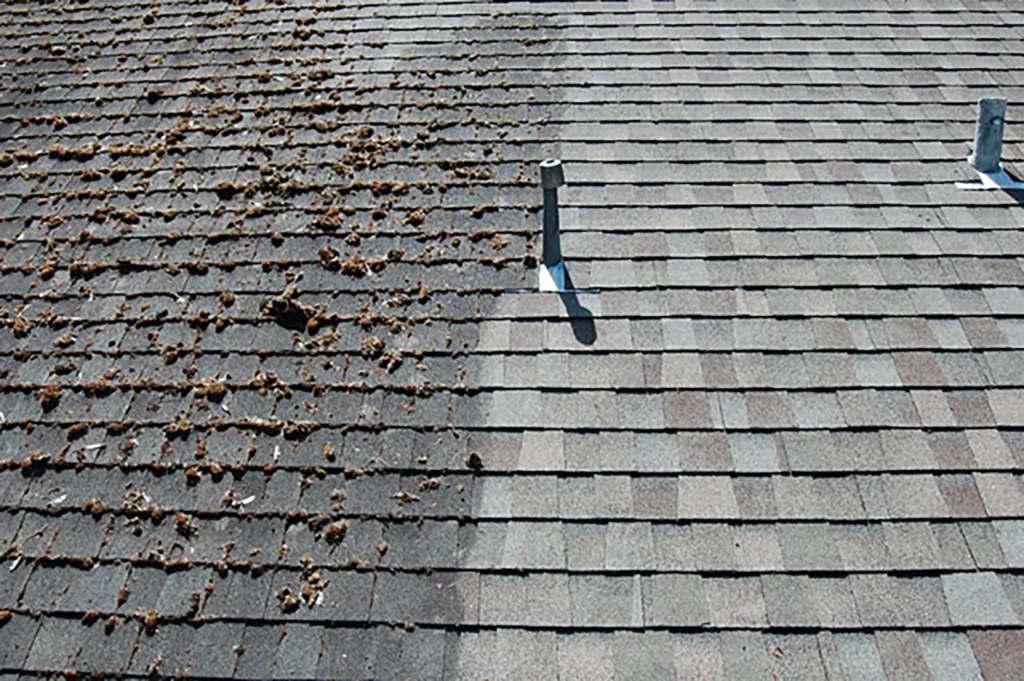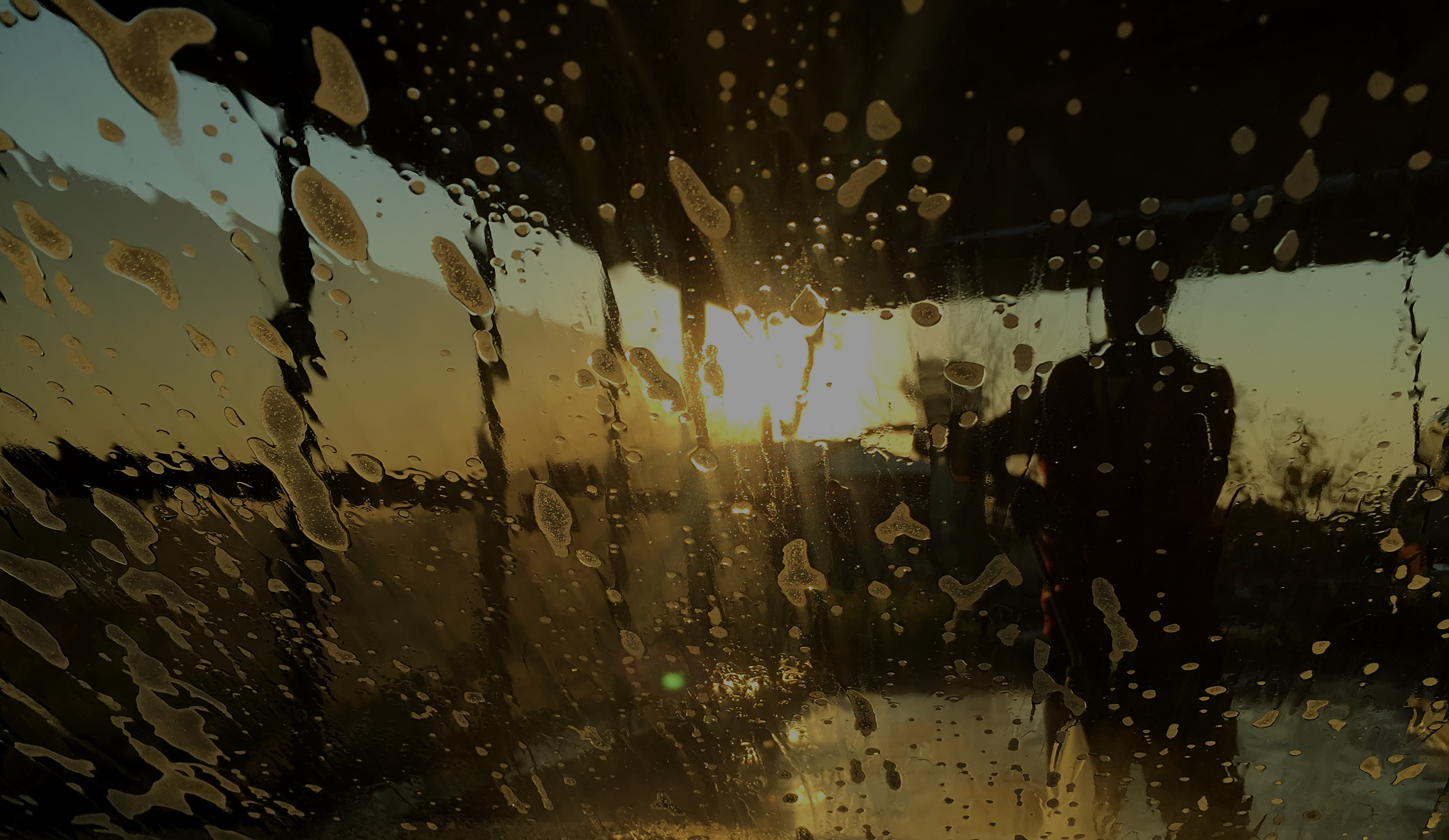30 Jul The Definitive Guide to Roof Washing: What, When, and Why
The roof, an often overlooked part of our homes, plays a critical role in protecting us from the elements. Over time, it can become a breeding ground for organic growth like moss and bacteria. This is where roof washing comes into play – a vital maintenance task that often goes unnoticed. In this comprehensive guide, we’ll delve into the “what, when, and why” of roof washing. We’ll explore the negative effects of organic growth, the benefits of regular roof cleaning, and how it contributes to the longevity and aesthetics of your home.
What is Roof Washing?
Roof washing, also known as roof cleaning, involves the removal of dirt, debris, moss, algae, and bacteria that accumulate on the roof’s surface over time. This process not only enhances the appearance of your home but also ensures the structural integrity of the roof. Roof washing can be performed using various methods, such as soft washing, pressure washing, and chemical treatments. The method chosen depends on the type of roofing material and the extent of contamination.
When Should You Wash Your Roof?
The timing of roof washing is crucial to its effectiveness. Ideally, roof cleaning should be a part of your regular home maintenance routine, but certain factors can influence the timing:
Season: The best time for roof washing is during the dry seasons of spring and summer. Rain can hinder the cleaning process, and allowing the roof to dry completely after washing is essential to prevent further organic growth.
Frequency: The frequency of roof washing depends on your location and the level of humidity. If your area experiences high humidity or is prone to frequent rain, more frequent cleanings may be necessary.
Visible Contamination: If you notice moss, algae, or other organic growth on your roof, it’s time for a cleaning. Ignoring these signs can lead to more serious issues down the line.
Preventive Maintenance: Even if you don’t see visible contamination, consider scheduling a professional roof inspection. Roofing experts can identify potential problem areas and recommend the appropriate cleaning schedule.
Why Should You Wash Your Roof?
The importance of roof washing goes beyond just aesthetics. Let’s explore the compelling reasons to prioritize this maintenance task:
Preventing Damage: Organic growth, like moss and algae, can damage the roof’s surface over time. Moss, for instance, can lift shingles and create entry points for water, potentially leading to leaks and rot.
Extending Roof Lifespan: Regular roof washing can significantly extend the lifespan of your roof. By removing contaminants that degrade roofing materials, you’re safeguarding your investment and saving money in the long run.
Energy Efficiency: A clean roof reflects more sunlight, reducing heat absorption. This can lead to lower energy bills as your home stays cooler during hot months.
Maintaining Curb Appeal: A clean roof enhances your home’s overall appearance. If you’re planning to sell, a well-maintained roof can make a positive first impression on potential buyers.
Health Concerns: Moss, algae, and bacteria on your roof can negatively impact air quality and potentially cause health issues for residents, especially those with allergies or respiratory conditions.
Negative Effects of Organic Growth
Organic growth on your roof might seem harmless at first, but it can have several adverse effects:
Structural Damage: Moss and algae can trap moisture, causing shingles to deteriorate faster. In colder climates, freezing and thawing cycles can exacerbate the damage.
Water Accumulation: Moss can prevent rainwater from flowing properly, leading to water pooling and potential leaks.
Allergens: Moss, algae, and bacteria release spores and particles that can worsen allergies and respiratory issues.
Aesthetic Degradation: Dark streaks and patches of organic growth can make your roof look unsightly, reducing your home’s curb appeal.
Energy Inefficiency: A roof covered in moss or algae can retain more heat, making your home less energy-efficient.
The Pros of Roof Washing
On the flip side, regular roof washing offers a range of benefits that cannot be ignored:
Enhanced Longevity: By removing contaminants, you’re preserving the structural integrity of your roof, extending its lifespan by years.
Improved Aesthetics: A clean roof instantly revitalizes your home’s appearance, boosting its curb appeal and value.
Preventive Maintenance: Regular cleaning allows you to identify and address potential issues before they escalate into costly repairs.
Energy Savings: A cleaner roof reflects sunlight, reducing heat absorption and aiding in maintaining a cooler home interior.
Health and Safety: Eliminating harmful growth promotes better air quality and a healthier living environment for you and your family.
In the grand scheme of home maintenance, roof washing might seem like a small task. However, its impact on the health and longevity of your roof, as well as the aesthetics of your home, cannot be underestimated. By understanding the “what, when, and why” of roof washing, you’re equipped to make informed decisions about keeping your roof in optimal condition. Whether you opt for professional roof cleaning or decide to tackle the task yourself, remember that regular maintenance today can save you from costly repairs tomorrow. So, the next time you look up at your roof, consider how a simple wash could make a world of difference.



